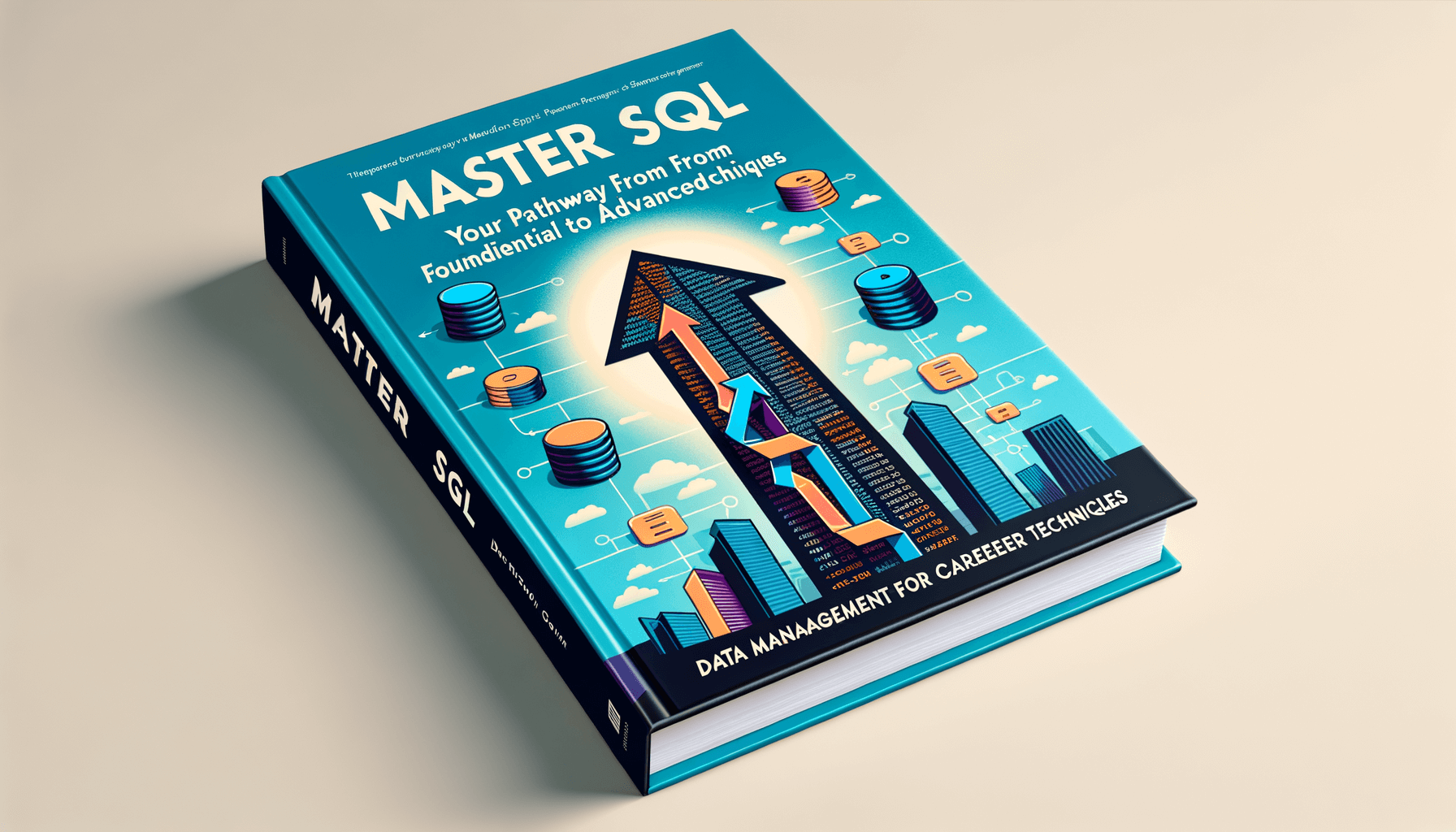A big variety of articles and resources

Mastering Your Career as an SQL Developer: Tips and Strategies
 Sia Author and Instructor
Learn SQL
Sia Author and Instructor
Learn SQL
13 minute read
Becoming a top-notch SQL developer requires more than just knowing how to write queries. It involves understanding database concepts, mastering advanced techniques, and staying updated with the latest trends. This article will guide you through essential tips and strategies to help you excel in your SQL development career.
Key Takeaways
- Understand the importance of building a strong foundation in SQL to set the stage for advanced learning.
- Learn advanced query techniques like subqueries and window functions to handle complex data tasks efficiently.
- Focus on effective database design and management practices to ensure data integrity and performance.
- Enhance your skills in performance tuning to optimize database operations and improve query speed.
- Stay updated with the latest SQL trends and continuously seek opportunities for professional growth.
Building a Strong Foundation in SQL
Understanding Database Concepts
To start with SQL, you need to grasp the basic ideas of databases. This includes knowing what tables, rows, and columns are. Mastering SQL requires dedication and practice. You should also understand how databases store and organize data.
Learning SQL Syntax
Next, you need to learn the SQL language itself. This means getting familiar with commands like SELECT, INSERT, UPDATE, and DELETE. These commands let you interact with the database and manage data.
Importance of Data Types
Data types are crucial in SQL. They define what kind of data can be stored in each column of a table. For example, you might have a column for numbers, another for text, and another for dates. Knowing the right data type to use helps keep your database organized and efficient.
Advanced Query Techniques for SQL Developers
Mastering Subqueries
Subqueries are a powerful tool in SQL that allow you to nest one query inside another. This can be useful for breaking down complex problems into smaller, more manageable parts. Understanding how to effectively use subqueries can greatly enhance your ability to write efficient SQL code.
Using Window Functions
Window functions are essential for performing calculations across a set of table rows that are related to the current row. They are particularly useful for tasks like running totals, moving averages, and ranking. Mastering window functions can make your queries more powerful and flexible.
Optimizing Complex Queries
Optimizing complex queries is crucial for improving database performance. This involves techniques like indexing, query rewriting, and analyzing execution plans. By focusing on optimization, you can ensure that your queries run efficiently, even as your database grows.
In my experience, mastering these advanced query techniques is key to becoming a proficient SQL developer. They not only make your queries more efficient but also open up new possibilities for data analysis and manipulation.
Effective Database Design and Management
Normalization and Denormalization
When designing a database, it's crucial to understand both normalization and denormalization. Normalization helps in organizing data to reduce redundancy and improve data integrity. However, sometimes denormalization is necessary to enhance performance by reducing the number of joins in queries.
Indexing Strategies
Indexes are vital for speeding up data retrieval. They work like a book's index, allowing you to find information quickly. But be cautious, as too many indexes can slow down write operations. It's all about finding the right balance.
Schema Design Best Practices
A well-designed schema is the backbone of any database. It should be intuitive and scalable. Always consider future growth and changes. Use clear and consistent naming conventions, and ensure that your schema supports the business requirements effectively.
Effective database schema design is essential for optimizing SQL queries and managing large datasets efficiently.
Performance Tuning for SQL Databases
Query Optimization Techniques
Optimizing queries is essential for improving database performance. Efficient queries reduce load times and resource usage. Start by analyzing your query execution plans to identify bottlenecks. Use indexing and partitioning to speed up data retrieval.
Understanding Execution Plans
Execution plans provide a roadmap of how SQL Server executes a query. By understanding these plans, you can pinpoint inefficiencies. Look for table scans and high-cost operations. Use this information to refine your queries and improve performance.
Improving Index Performance
Indexes are crucial for fast data retrieval, but they can also slow down write operations. Balance is key. Regularly monitor and maintain your indexes. Remove unused indexes and consider using composite indexes for multi-column searches.
Performance tuning is an ongoing process. Regularly review and adjust your strategies to keep your SQL databases running smoothly.
Data Security and Compliance
Implementing Data Encryption
When it comes to protecting sensitive information, data encryption is a must. Encryption ensures that even if data is intercepted, it remains unreadable without the correct decryption key. This is especially important for databases that store personal or financial information. I always recommend using strong encryption algorithms and regularly updating your encryption keys to maintain security.
Role-Based Access Control
Role-Based Access Control (RBAC) is a method to restrict system access to authorized users. By assigning roles to users, you can control who has access to what data. This minimizes the risk of unauthorized access and helps in maintaining data integrity. For instance, a marketing analyst might have access to customer data but not to financial records.
Ensuring Regulatory Compliance
Compliance with regulations like GDPR or HIPAA is crucial for any organization handling personal data. These regulations set the standards for data protection and privacy. Failing to comply can result in hefty fines and damage to your reputation. Therefore, it's essential to stay updated with the latest regulatory requirements and implement necessary measures to ensure compliance.
In today's digital age, securing your database is not just an option but a necessity. Implementing robust security measures can save you from potential data breaches and legal issues.
Leveraging SQL for Data Analysis
Using Aggregate Functions
Aggregate functions are essential for summarizing data. Functions like SUM, AVG, COUNT, MIN, and MAX help in deriving meaningful insights from large datasets. Mastering these functions can significantly enhance your data analysis skills. For example, using SUM to calculate total sales or AVG to find the average score in a test can provide quick insights.
Data Cleaning Techniques
Data cleaning is a crucial step in data analysis. It involves removing duplicates, handling missing values, and correcting errors. Techniques like using TRIM to remove extra spaces or COALESCE to handle null values can make your dataset more reliable. A clean dataset ensures that your analysis is accurate and trustworthy.
Building Analytical Reports
Creating analytical reports involves organizing and presenting data in a way that is easy to understand. Using SQL, you can generate detailed reports that include tables, charts, and summaries. These reports can help stakeholders make informed decisions. Effective reporting not only showcases your SQL skills but also your ability to interpret and present data clearly.
In data analysis, the quality of your insights is directly proportional to the quality of your data. Always prioritize data cleaning and accurate reporting to ensure reliable results.
SQL in Cloud Environments
Introduction to Cloud Databases
Cloud databases are becoming increasingly popular due to their scalability and flexibility. They allow businesses to store and manage data without the need for physical hardware. Understanding the basics of cloud databases is essential for any SQL developer looking to stay relevant in today's job market.
Migrating Databases to the Cloud
Migrating databases to the cloud can be a complex process, but it offers numerous benefits such as cost savings and improved performance. Here are some steps to consider:
- Assess your current database environment.
- Choose the right cloud service provider.
- Plan the migration process carefully.
- Test the migration thoroughly before going live.
Managing Cloud-Based SQL Databases
Once your database is in the cloud, managing it effectively is crucial. This includes monitoring performance, ensuring data security, and optimizing queries. Regular maintenance and updates are also important to keep your database running smoothly.
Cloud databases are not just a trend; they are the future of data management. Embracing this technology can significantly enhance your career as an SQL developer.
Career Development for SQL Developers
Certifications and Training Programs
Certifications can be a game-changer in your career. They not only validate your skills but also make you stand out in the job market. Consider pursuing certifications like Microsoft Certified: Azure Database Administrator Associate or Oracle Certified Professional. These programs often include hands-on projects that mirror real-world problems, giving you practical experience.
Networking and Professional Growth
Networking is crucial for professional growth. Join SQL communities, attend conferences, and participate in online forums. These platforms offer opportunities to connect with industry experts and stay updated on the latest trends. Building a strong network can open doors to new job opportunities and collaborations.
Job Market Trends
Staying informed about job market trends is essential. The demand for SQL developers is growing, especially in industries like finance, healthcare, and e-commerce. Keep an eye on job postings and industry reports to understand what skills are in demand. This will help you tailor your learning and stay competitive.
Continuous learning and networking are key to advancing your career as an SQL developer. Stay curious and proactive in seeking new opportunities.
Collaborating with Cross-Functional Teams
Understanding Business Requirements
To be an effective SQL developer, it's crucial to understand the business requirements. This means knowing what the stakeholders need and how the data will be used. Clear communication with business analysts and project managers helps ensure that the database solutions you create meet the actual needs of the business.
Communicating with Stakeholders
Effective communication with stakeholders is key. You need to explain technical details in a way that non-technical team members can understand. This might involve creating simple diagrams or using plain language to describe complex SQL queries. Listening to their feedback is equally important to refine your solutions.
Integrating SQL with Other Technologies
SQL doesn't exist in a vacuum. Often, you'll need to integrate SQL databases with other technologies like web applications, data visualization tools, or machine learning models. Understanding how SQL fits into the larger tech stack can help you create more efficient and scalable solutions.
Working well with cross-functional teams not only improves the quality of your work but also enhances your professional relationships and career growth.
Continuous Learning and Skill Enhancement
Staying Updated with SQL Trends
In the fast-paced world of technology, it's crucial to stay updated with the latest SQL trends. New features and updates are constantly being released, and keeping up with them can give you a competitive edge. I make it a habit to read industry blogs, attend webinars, and follow SQL experts on social media.
Participating in SQL Communities
Being part of SQL communities can be incredibly beneficial. These communities offer a platform to ask questions, share knowledge, and learn from others' experiences. I actively participate in forums and attend local SQL meetups. This not only helps me solve problems faster but also expands my professional network.
Exploring Advanced SQL Topics
To truly master SQL, it's important to delve into advanced topics. I set aside time each week to explore areas like performance tuning, advanced query optimization, and data warehousing. This continuous learning approach ensures that I am always improving and ready to tackle more complex challenges.
Continuous learning is not just about acquiring new knowledge; it's about staying curious and always striving to improve.
Real-World Applications of SQL
Case Studies in Various Industries
SQL is used in many industries to solve real-world problems. For example, in healthcare, SQL helps manage patient records and analyze treatment outcomes. In finance, it is used to track transactions and detect fraud. Retailers use SQL to manage inventory and analyze sales trends.
Problem-Solving with SQL
SQL is a powerful tool for solving complex problems. Whether it's optimizing a database for faster queries or cleaning up messy data, SQL provides the tools needed. I often find myself using subqueries and joins to break down complicated tasks into manageable steps.
Innovative Uses of SQL
SQL isn't just for traditional databases. It's also used in big data environments and cloud-based systems. For instance, SQL can query large datasets stored in Hadoop or analyze real-time data streams. This flexibility makes SQL an essential skill for modern data professionals.
SQL's versatility allows it to be applied in various scenarios, making it a valuable skill for any data professional.
SQL is used in many real-world applications, from managing databases in businesses to analyzing data in research. If you want to learn more about how SQL can help you in your career, check out our courses. We offer a range of classes that can help you become a SQL expert. Visit our website to get started today!
Conclusion
Mastering your career as an SQL Developer requires a blend of technical skills, continuous learning, and practical experience. By following the tips and strategies outlined in this article, you can enhance your SQL proficiency and stay ahead in the ever-evolving tech landscape. Remember, the key to success lies in your commitment to learning and adapting to new challenges. Keep practicing, stay curious, and you will find yourself excelling in your SQL development career.
Frequently Asked Questions
What is SQL and why is it important?
SQL stands for Structured Query Language. It's used to manage and manipulate databases. It's important because it allows you to retrieve and update data efficiently, which is crucial for many applications.
How do I start learning SQL?
You can start by taking online courses, reading tutorials, and practicing with sample databases. Many platforms offer beginner-friendly courses to help you get started.
What are some common SQL commands?
Some common SQL commands are SELECT, INSERT, UPDATE, DELETE, and JOIN. These commands help you retrieve data, add new data, modify existing data, remove data, and combine data from different tables.
What are subqueries in SQL?
Subqueries are queries nested inside another query. They allow you to perform more complex searches and data manipulations by breaking them into smaller, manageable parts.
Why is database normalization important?
Normalization helps organize data to reduce redundancy and improve data integrity. This makes the database more efficient and easier to maintain.
How can I optimize my SQL queries?
You can optimize SQL queries by using indexes, avoiding unnecessary columns in SELECT statements, and writing efficient JOINs. Understanding execution plans can also help identify performance bottlenecks.
What is the role of indexing in SQL?
Indexing improves the speed of data retrieval operations on a database table. It works like a book index, allowing the database to find rows more quickly.
How do I ensure data security in SQL databases?
Data security can be ensured by implementing data encryption, using role-based access controls, and following regulatory compliance guidelines to protect sensitive information.







